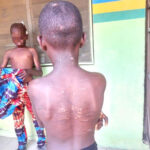Some months ago, a wedding I planned to attend was postponed. Barely 48 hours to the date, the father of the bride called the groom’s father and asked that the date be postponed till further notice. His half-hearted reason that the family was not ready financially was met with a fierce rebuttal. How could they not be ready? When the bride’s house had already been decorated? Had the bride changed her mind? Or did the father have a change of heart?
The father resisted all pressure and gave no further explanation. Meanwhile, the daughter continued asking her fiancé to be patient as she was going through ‘stuff’. I got to know what ‘stuff’ meant when the bride’s mother called and booked an appointment.
Mother and bride were punctual but refused to say anything when they entered the consulting room. The bride looked downcast and seemed preoccupied with her toenails. Fifteen minutes later, my patience had grown thin.
‘Hajia, I have other patients waiting’
By then, I was already thinking of the worst. Perhaps the girl had HIV? Or Cancer? Or had been raped?
The mother, realizing her daughter was never going to divulge the problem, stammered:
‘Aisha* wets the bed at night’.
At age 27, her young daughter, who had a bachelor and masters degree and worked for an insurance company, still occasionally wet the bed. The bride looked like she wanted to die from embarrassment. Her mother was the only one who knew her secret. She woke at dawn every morning to wash her beddings and clean herself up. She had been bedwetting since childhood and throughout secondary school. When she turned seventeen, the frequency of the nigh-time bedwetting reduced greatly and she was giddy with relief. Four years ago, it suddenly returned and became a daily affair. She was constantly burning incense in her room to hide the smell of urine. Her mother was worried and dragged her from one mallam to another collecting concoctions. Later, they decided to confront the problem.
The bride’s mother finally summoned the courage to tell her husband, the bride’s father. Ranar wanka, ba’a boye cibiya.
You know when you realise that you are the last to know something that has been happening right under your nose; You know that feeling of betrayal? That is how most people would feel. However, the realization that his oldest daughter would be married in a few days with this embarrassing situation prevented him from acting out.
Adult, bedwetting. It’s a rarely talked about the condition but is one that affects many people. People struggle with this condition for all sorts of reasons – spinal cord injuries, neurological diseases, and even stress can cause bedwetting. And sometimes there can be seemingly no cause at all, which makes it all the more frustrating to address. Most people who wet the bed are desperate for a solution. They find it deeply embarrassing, and it greatly affects their quality of life, as they are constantly dealing with keeping things clean and worried about how it will affect current or future relationships.
Enuresis (medical jargon for bedwetting) is primarily divided into two: Primary enuresis (which means the patient has never achieved nighttime dryness for six months consecutively) and Secondary enuresis, which means the child stopped bedwetting for some years and then suddenly started again.
The pathophysiology of primary nocturnal enuresis involves the inability to awaken from sleep in response to a full bladder, coupled with excessive night-time urine production or a decreased functional capacity of the bladder. The initial evaluation should include a history, physical examination, and urinalysis. Several conditions, such as constipation, obstructive sleep apnea, diabetes mellitus, diabetes insipidus, chronic kidney disease, and psychiatric disorders, are associated with enuresis. If identified, these conditions should be evaluated and treated.
Aisha’s case was that of primary bedwetting as she had started since childhood and had never been dry for up to six months. Recently, and I attributed it to the stress of planning a wedding, she could wet the bed up to twice at night. She slept heavily, as is normally the case in Enuresis and sometimes did not wake up until dawn or the wetness caused enough discomfort to wake her up. At night, she often had nightmares which caused her to wake up abruptly only for her to discover that she had urinated on the bed. As expected, she was deeply depressed and afraid that her fiancé would find out and call off the wedding.
This was my first time managing adult bedwetting. I think the oldest I have ever treated was a 15-year-old teenager in boarding school. So, you can imagine that I was intrigued and also happy to be challenged. The day had been boring so far with usual hypertension, malaria and respiratory tract infection. Finally, I had an interesting case!
After noting all the necessary history and examination findings, I made a diagnosis of Primary enuresis in a woman with background anxiety disorder. She confessed to being naturally anxious by nature. Those people who frequently have palpitations and worry over everything and nothing, yet not being able to stop it.
I asked her to run some tests to rule out other diagnoses and to return the following day with the results. She was asked to cut down on fluids after 6pm and to get a bed-wetting alarm. The results were as I expected- negative for all other conditions. Her condition had no real cause and was linked to her anxiety. This time, the bride returned with both her parents. Her father wanted to hear from the doctor himself. A wide gap of distrust had developed between him and his wife. It was painful to acknowledge. I tried as best as I could to educate them on the patient’s condition, using diagrams and examples.
Enuresis is often hard to treat, but in Aisha’s case, a single drug could be used to treat both her bedwetting and depression. The drug was originally formulated to treat depression but also had anticholinergic side effects which caused dryness of the mouth and bladder. One drug- two jobs; the wonders of science.
Aisha returned two weeks later in tears. Between sobs, she told me that the drug was working as she had been dry for 10 days but that this intervention had come too late. Her fiancé had succumbed to pressure and decided to call off the wedding. I was so disappointed and decided to do what I usually shied away from meddling in people’s affairs. I asked her to call him and invite him over. He came about an hour later.
It was easy to see that they were besotted over each other. He was a young handsome man whose parents were angry over the postponement of the marriage without any tangible reason. They had therefore pressured him to call it off, speculating that the girl must have some hideous disease she was hiding. With Aisha’s permission, I told him what the problem was and asked if he loved her enough to help her on this treatment journey. The look of relief on his face was priceless!
There and then, we cooked up a reason to tell his parents so that they could agree and give her more time. Little white lies that could save a marriage.
By the end of December, Aisha will be dry for five months and her transformation into a confident beautiful woman is something that gives me great joy. Her wedding has been scheduled for the first quarter of next year.
What God has joined together, let no man, or bedwetting, put asunder!

 Join Daily Trust WhatsApp Community For Quick Access To News and Happenings Around You.
Join Daily Trust WhatsApp Community For Quick Access To News and Happenings Around You.


